Which is more important – eating local or eating organic? Since moving to Missouri in the fall of 2012, I’ve grappled with this question quite a bit. In our previous home in the Willamette Valley of Oregon, it was fairly easy to fulfill both of these ideals – I could go to one of several natural food stores and purchase locally grown organic food, shop the Farmer’s Market, or grow my own food nearly year-round in a high tunnel.
Here in Northeast Missouri, the four-season climate makes for a spectacular late spring through early fall harvest. I grow a large garden and have connected with a local farmer who uses organic practices. Last fall I purchased large quantities of storage crops from him, such as sweet potatoes, potatoes, turnips, winter squash, and onions. I also did some canning and freezing of the summer’s bounty. These stores brought us well into December with delicious organic AND local food.
But when January arrived, the bulk of our produce had been eaten, and the “hunger months” began. Of course I could drive to my local grocery store and purchase food, but local food? Nope. Organic food? Well yes, but it was from either California or South America and the quality was not great.
I’m not a hard line purist, but I strive to source food from as close to my bioregion as possible. But sometimes buying local means that I’m buying food that has been treated with chemicals, which I really try to avoid.
A recent email conversation with a local blueberry u-Pick farm elucidates this problem. When I asked the farmer what his growing practices were, his reply was that he did not use pesticides at all, only began using fungicide this season when he could not control a stem blight with pruning alone, and did control weeds with glyphosate when mulch and hand-pulling were not adequate.
So, here is a farmer who tries to avoid chemicals, but opts to use them when the health of the plant or the conditions of patch necessitate. But, his berries are not “Organic.” I could go to the local grocery store and purchase “Organic” blueberries, but they would have been shipped from elsewhere in the country, packaged in plastic, and sold for several dollars per pound more. Furthermore, I do not have the opportunity to see the blueberry patch with my own eyes. I do not know how they are grown, who is picking them, and what their conditions are.
Which option should I choose?
In this case, I’m choosing local. When I go to the local blueberry farm, I see the berries with my own eyes, I pick them with my own hands, and I chat with the grower and his family. I feel a connection to his life, and he to mine, and together we form a tighter community network of food security. In fact, in a recent conversation, this very farmer offered to come out to my homestead to give advice on getting a blueberry patch growing.
Some day I hope not to have to choose between local and organic. I aim to be a part of a local community network of homesteaders and gardeners who can share surplus or trade produce. I’m passionate about supporting my local farmers AND I’m passionate about eating the most healthy and nutrient dense foods imaginable.
How do you decide which is more important, eating local or eating organic? Share in the comments below!
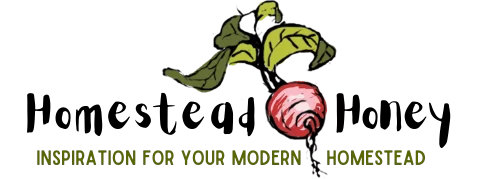
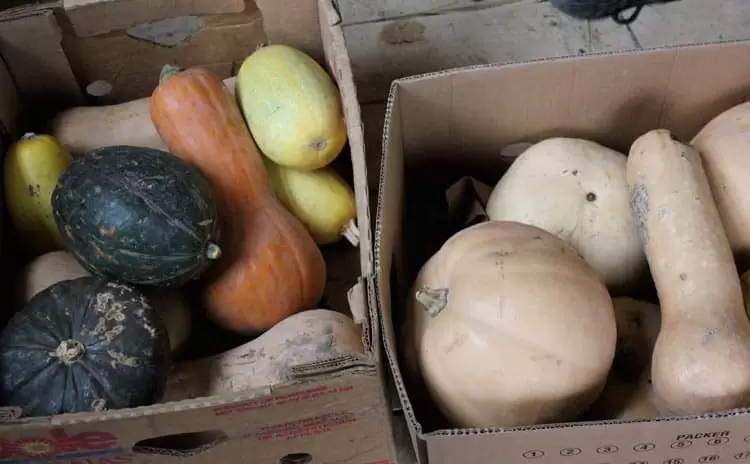
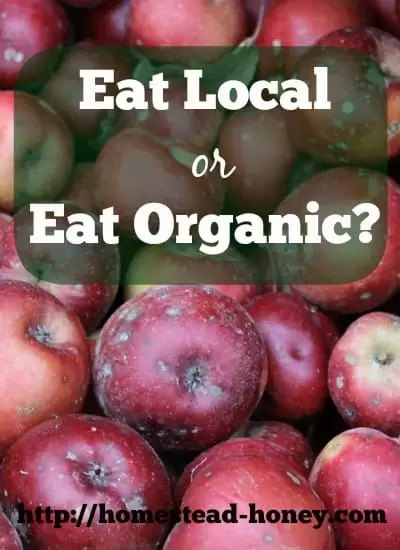
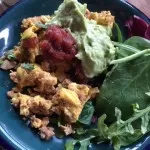
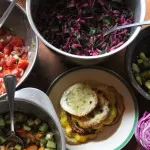
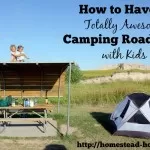

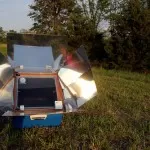
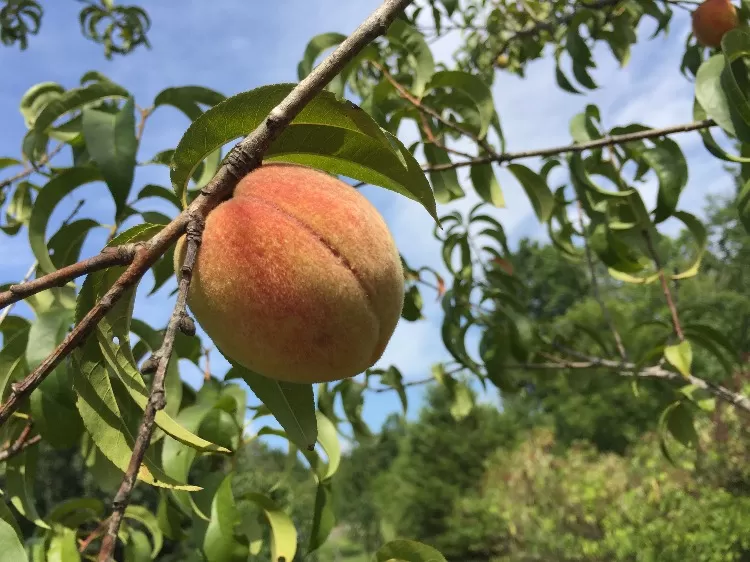


This is definitely a topic I’ve been struggling with too! My first choice is always organic + local, but like you said – that’s not always possible. In Massachusetts, we have long, cold winters that usually means no local produce from November – April/May. When organic + local food isn’t available, I tend to lean towards organic. But I’ve found myself questioning – since it’s imported, how do I even know if it’s organic?!
You make great points about leaning toward local over organic. I definitely can see myself adopting this approach come the winter!
I always try to visit the local farms if at all possible and make sure I ask about their growing practices. Then I can feel comfortable choosing local over organic!
I really appreciate your honesty. Being in tune with one’s surroundings and the connection you gain from knowing the farmer is high up on the list. It would be great if all the choices were easy when it came to nutrition and real foods but hopefully in time, as more people step away from the S.A.D. and step onto a farm or in a garden, they’ll be open to building those relationships with people — the ones who grow our food.
They are some of the most important people out there, in my opinion! Thanks for sharing your thoughts!
I agree…it’s hard to choose between organic and local when organic is shipped across country. I barely get enough canned to get everything I want to make my family get through the winter. So I pick and choose what we use most of since we don’t have the storage space or the growing space. (tomatoes as marinara sauce, stewed tomatoes, salsas, a chili mix with peppers and onions for when we make chili, dried herbs, hot pepper rings, apple sauce, peaches, pears). I too would rather buy local if the only other option is an organic product shipped across the country.
Sounds like quite a bounty that you do manage to put up, Brenna! But I struggle with getting enough stored. I’m great at growing, less great at preserving enough!
I bounce around on this topic a bunch. I guess perfect would be close and organic, second choice is always close by and third choice is organic. I also try to pay attention to the dirty dozen and clean 15 lists to help guide my buying traumas! That seems to help alleviate some of the worry when I’m buying non-organic local stuff. At least it hasn’t been hip with too many pesticides.
I will buy local more often. It’s just what makes me feel better. If I buy a squash from a farmer who lives 3 miles away I just helped him pay his rent. If I buy it from Safeway – nothing happens. I love my community just like you do!!
Great article, lady -thank you!
Thank you for sharing your thought process, Lindsey! And thanks for the reminder about those “dirty dozen” type lists. I definitely prioritize organic dairy and meat and certain veggies over others.
Idealism is a hard row to hoe. I tried to be a purest, growing most of my food, leaving the farm only for dire necessities, trying every alternative to fossil fuels. Then I would drive 75 miles to socialize and dance and spend time and money that was not holding the line of my ideals. But I am so glad that I did, because while I felt I was on hiatus there, I met you and other like minded individuals . Intention is important; even when we don’t meet our own expectations. Carry your intention wherever you go and it will instruct you and others along the way. We are tied to a society that values other things and we must keep pulling it in the direction that we feel is right. Things are coming along slowly, but they are changing for the better, I believe.
Great perspective, Ed. Strive for your ideals and be gentle with yourself and others when they don’t happen.
Teri, this is a thoughtful, important topic. Thank you for writing about it.
We struggle with similar questions. Our garden isn’t feeding us at this point in our lives (tiny, urban backyard garden that’s mostly shaded), so for fruits and veggies we are dependent upon the local farmers markets and of course, the grocery store. (We do buy all that we can from local farmers, but NY winters make for a short growing season!)
The same is true for the meat we purchase. We’ve been purchasing “authentic” (yes, that definition varies from person to person) beef and pork from a local farmer for several years now. We’ve been to the farm. We’ve been inside the barns, we’ve walked the property. We’ve preferred to buy our beef from this farm versus the organic beef (often raised in Uruguay) found in the grocery store. We know that the farmer does not use growth hormones or antibiotics. However, we do know that although he raises all the food for the animals on his farm, he also uses GMO corn. (The animals get a mixed diet of grass/hay/corn/grain.)
So what do we do? We care about our carbon footprint, and like you, we can’t walk the farm hundreds or thousands of miles from here to understand how the food is raised there. The “approved organic” practices of another country might not match US standards (assuming that our standards really are the best). It’s a tough balance.
And, the price of organic food can turn off a lot of potential customers – and although the argument could easily be: what’s your health worth? – it’s understandable. So many people are raising families and trying to make ends meet. When one organic apple costs $1.40 at the grocery store, it’s hard to convince a struggling family to make the purchase.
I think conversation – like this one you have started – can help people decide how to approach the buying (potentially non-organic) local versus organic question. By engaging others and sharing good information, people can find ways to improve their food and find the “right” sources for things they cannot grow themselves. In fact, a recent conversation led me to a “new to me” Sunday farmers market with various mostly organic vendors. For pennies per pound more, we found an organic meat vendor that I had looked up online in the past. (They are not as local as the farmer I usually buy from.) Their meat was very good, and now I have another option. Will I still buy from the farmer I already know? I’m sure I will.
Thanks again for your post, Teri. Reading it and thinking about what I wanted to say in a comment brought a Rainer Maria Rilke quote to mind. I shortened it as this is already a long comment! (Sorry!) He wrote: “…Live the questions now. Perhaps then, someday far in the future, you will gradually, without even noticing it, live your way into the answer.”
So yes, let’s live the questions by asking them of ourselves, sharing thoughts with others, and learning from each other. 🙂
That is such a great quote, Tracy. I might have to create a little inspirational image to go with that! Thank you so much for sharing your thoughts about this topic, and how you go about making your choices. I love this dialogue!
I would always choose organic versus local, especially when the farmer uses glyphosate as a weed killer. Glyphosate kills not just the weeds but beneficial microbes in the soil as well, and it has the same effect on our gut bacteria.
Thanks for chiming in, Holly! I hope this particular farm re-evaluates that practice.